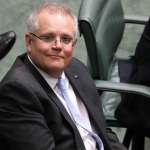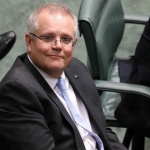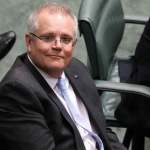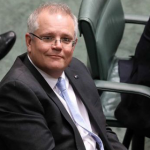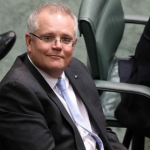Morrison’s Victory and What the Nation Has Agreed To
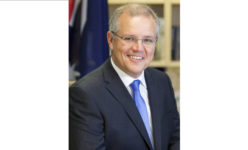
Last week, he was our unelected PM. Indeed, the ex-immigration minister had presented himself as the “accidental” head of state following last August’s Liberal leadership spill. But, on Saturday, the nation spoke, and choose Scott Morrison as our duly elected 30th prime minister.
The reigning PM credited his win to the “quiet Australians”, which the New York Times posited is a similar group to the “populist wave” that saw Donald Trump voted in as US president back in 2016, as well as those in the UK who voted in favour of Brexit earlier that same year.
While locals may counter that the result in no way saw a swing to the right, as all that took place was a simple return to office of the conservative Coalition government, it was more about what was at stake at this election that revealed the nation was actively siding with the reactionary agenda.
The Australian public voted against taking any action on the growing climate emergency and investment proposals in health and education in favour of no tangible policies from government, but the offer of quick fix tax breaks and an unsubstantiated promise of a strong economy.
A showing from the right
And as a handy safety valve for wavering voters who were questioning whether a vote for the Coalition was too far right, ballot papers came with a hefty showing of candidates from further right parties that actually made those who in the end opted for Liberal feel slightly progressive.
Every ballot paper had at least one Clive Palmer party member to choose from. The seat of Sydney also had a showing from Fred Nile’s team. While Tasmania’s Franklin seat featured a Fraser Anning candidate, and Queensland’s Fairfax seat, included a One Nation candidate, as well as an Anning.
So, now that our nation has made its choice, what can we look forward to over the next three year term with the Coalition in office?
Longer summers
Regardless of whether the ultra-conservative Liberal faction stuck the knife into Turnbull’s back over his policies or because they just didn’t like him, on the surface it was all to do with his modest plans to curb carbon emissions in an attempt to address global heating.
And to take over the leadership role climate-denying Scott Morrison opportunely tripped into place, following an appearance in parliament a year and a half earlier, where he was seen to be brandishing a lump of coal, as he spruiked the future with the fossil fuel industry.
Front and centre of the climate emergency debate is the proposed Adani mine in Queensland’s Galilee Basin, which is staunchly supported by the Coalition, as well as being an issue the Labor Party strategically avoided during the election.
Securing the mine’s passage prior to his expected loss, Morrison announced in April that the CSIRO had signed off on a water plan, which was the final obstacle for Adani at the federal level. However, it’s since come to light, the government forced the agency to tick off on it in an afternoon.
And if the reinstated Coalition government is successful in aiding the opening of the Carmichael mine, as former Australian Greens leader Bob Brown told Sydney Criminal Lawyers in March, it will open up the basin not only to Adani, but to “five or six other huge coal mines”.
Dutton’s mass surveillance project
While passing laws in the name of national security that slowly erode citizens’ rights is a bipartisan pastime, it’s something that the Coalition seem to have a better hand at. Over the past six years, it’s passed quite a number of laws to counter terrorism, which are also useful in quelling dissent.
There was Abbott’s 2014 hat trick that saw a foreign fighters bill restrict movements overseas, another that greatly increased the reach of security agencies, while a third created a regime that allows for warrantless access to citizens’ stored metadata for a number of agencies under ASIO.
And last year was another great innings, as legislation was passed, which enacted espionage laws that silence criticism of government, sabotage offences that can lead to long-term prison for protesters, as well as new laws that open up encrypted messaging for government to peruse.
But, one piece of legislation that home affairs minister Peter Dutton had been wringing his hands over for some time was the Identity-Matching Services Bill 2018, which lapsed after the dissolution of parliament in April as the federal election was announced.
On Saturday, to the disbelief of many, Dutton too rose from the dead. And now, it can be assumed that he’ll be resurrecting his lost legislation that aims to establish a mass surveillance system that can link footage from all CCTV cameras nationally with all citizens’ ID photos in real time.
Protecting his own beliefs
A personal focus of Morrison’s is religious freedoms. And this has been a preoccupation of his even before he acquired the top job. A staunch opponent of marriage equality laws, the PM has been aiming for religious protection legislation to be introduced into parliament since December 2017.
On election night, when Morrison was returned to the position of PM, he likened the event to a “miracle”. He’s the first Australian prime minister to be a member of the Pentecostal Church, which is a faith that 1.1 percent of the nation follows.
After an October 2018 outcry over exemption laws that allow students and teachers to be thrown out of religious schools due to their sexuality, Mr Morrison eventually buckled to pressure and agreed to revoke the laws pertaining to students as soon as possible. But, he never did.
Instead, last December, Morrison announced that he plans to legislate for a Religious Discrimination Act, which would basically further ensure that people can discriminate against others if their sexuality or aspects of their lifestyle do not adhere to that individual’s religious beliefs.
It’s almost certain that Morrison will be banging on yet again about this idea quite soon. But, this time, he’ll be acting like he’s got a golden ticket to do so as he pleases, after he won the election by the grace of god.
Imprisoned on our behalf
It’s also an opportune time to spare a thought for the over 850 refugees the Coalition has had incarcerated on islands for the last five years, as it’s unlikely these fellow human beings are going to be shown any mercy from a PM who continues to brag about sending them there in the first place.
And it’s going to get progressively harder for us to successfully scrub the blood that’s complicity staining our own hands over Nauru and Manus, as, in the glow of our TVs, we reflect upon how unexpected the election results were, along with the pending nightmare that’s about to unravel.


